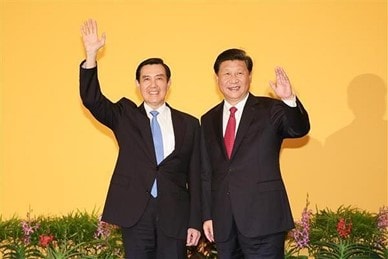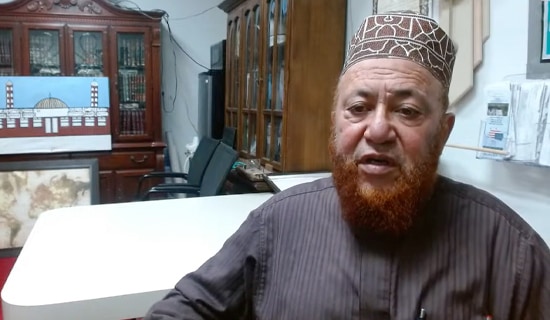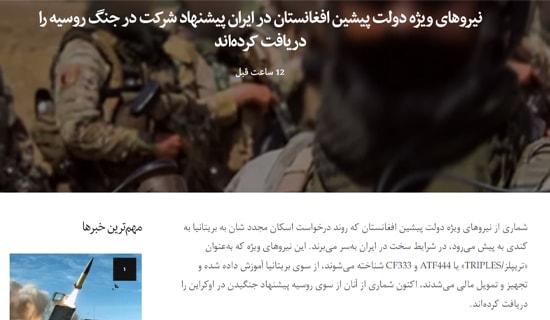Chinese President Xi Jinping has been paying close attention to the Taiwan issue since he became the head of the Chinese Communist Party (CCP) in November 2012. At the very beginning of his tenure as the top leader of the Party and the country, some analysts believed that he would be more understanding of Taiwan affairs and public opinion, as he had served for 17 years in China's Fujian province, which is across the Taiwan Strait. Even if Xi was not Taiwan-friendly, he should at least have been the CCP leader who knew and understood Taiwan best. However, optimism in this matter has long since evaporated; over his near-decade in power, Xi's speeches and statements have reflected an increasingly tough and fierce stance regarding the island.

(Source: News.seehua.com)
Xi Jinping And Ma Ying-jeou Historic Summit
In November 2015, Xi Jinping and Taiwan president and former Kuomintang chairman Ma Ying-jeou.[1] Met in Singapore, for the first meeting between China's and Taiwan's leaders since the People's Republic of China was established in 1949.[2] The CCP media outlet Global Times wrote that the meeting was a "major breakthrough in relations between Taiwan and the mainland."
The Global Times also wrote: "Xi's political appeal has impressed both sides of the Straits and the whole world... His appeal is essential for taking key steps to realize the great rejuvenation of the Chinese nation. Ma deserves warm applause for his willingness to have the meeting. With seven months left in office, during his term the 1992 Consensus has been well upheld and cross-Straits cooperation prospers. Despite his controversial governance of Taiwan, the positive factors of cross-Straits ties may have a longer influence on Taiwan's future path than Ma's term."

Xi Jinping meets with Taiwan president Ma Ying-jeou. (Source: Taiwan Presidential Office)
The Xi-Ma meeting, referred to as "historic," came ahead of the January 16, 2016 Taiwan presidential and legislative elections, and observers at the time wondered whether the meeting would impact the election results. It is worth noting that the Kuomintang – the Chinese Nationalist Party, China's onetime ruling party whose members fled to Taiwan after it was defeated in the 1949 Chinese Civil War[3] – supports the "1992 Consensus,"[4] maintaining opposition to both de jure Taiwanese independence and China's "one country, two systems."
In those elections, however, Tsai Ing-wen, the Democratic Progressive Party (DPP) presidential candidate, won a sweeping victory with 56.1 percent of the vote, displacing the Kuomintang. As soon as Tsai Ing-wen took power on May 20 of that year, she implemented a policy of gradually alienating China. In particular, after her 2020 reelection by a record high voter turnout, it was clear that Xi Jinping had lost hope and patience with Taiwan authorities and people; since then, his attitude towards the Taiwan issue has became increasingly tough.
The Evolution Of Xi's Attitude As Reflected In His Speeches
The evolution of Xi's attitude and thinking towards Taiwan can be clearly seen in a series of speeches he has made in recent years:
Ceremony Marking The 95th Anniversary Of The Founding Of The CCP
On July 1, 2016, at a ceremony marking the 95th anniversary of the founding of the Chinese Communist Party, Xi pointed out that advancing the process of the "peaceful reunification of the motherland" and completing the "great cause of the reunification of the motherland" is an inevitable requirement for realizing the great rejuvenation of the Chinese nation. "One country, two systems," he added, has achieved "universally recognized success," and it will never waver.[5]
Ceremony Marking The 150th Anniversary Of The Birth Of Sun Yat-sen
A few months later, on November 11, 2016, at a ceremony marking the 150th Anniversary of the birth of Chinese statesman, physician, and political philosopher Sun Yat-sen (November 12, 1866-March 12, 1925),[6] Xi emphasized: "We will never allow anyone, any organization, any political party, at any time, in any form, to split any piece of Chinese territory from China!" Sun Yat-sen served as the provisional first president of the Republic of China, the sovereign state based in mainland China from 1912 to 1949 until its government moved to Taiwan as a result of the Chinese Civil War,[7] and was the first leader of the Kuomintang.
In his speech, Xi said: "Dr. Sun Yat-sen always firmly upheld national unity and ethnic unity, and clearly opposed all remarks and actions that could split the country and the nation. Dr. Sun Yat-sen once said: 'China is a united nation, which has been firmly imprinted in our historical consciousness, and it is this consciousness that has preserved us as a nation.' He stressed that reunification is the hope of all Chinese people: 'When the country is united, all its people enjoy happiness; If the country cannot be united, it will suffer. '"
"Achieving the complete reunification of the motherland is in the fundamental interests of the Chinese nation, as well as the common aspiration and sacred duty of all sons and daughters of the Chinese nation. It is the common will of all Chinese people to ensure the integrity of the country and safeguard the fundamental interests of the Chinese nation, and it is an irresistible historical trend.
"Compatriots on both sides of the Strait are linked by blood and are flesh and blood brothers. The two sides of the Taiwan Strait form an inseparable community with a shared future. The peaceful development of Cross-Strait relations is the right path to safeguard Cross-Strait peace, promote common development, and benefit compatriots on both sides of the Strait. We will adhere to the common political foundation of the 1992 Consensus, deepen economic and social integration across the Strait, and enhance the wellbeing and kinship of our compatriots. We are ready to conduct exchanges with any party, organization or individual in Taiwan, no matter what they have argued in the past, as long as they recognize the 1992 Consensus and recognize that both the mainland and Taiwan belong to one and the same China.
"The future and destiny of compatriots on both sides of the Strait are inextricably linked to the great rejuvenation of the Chinese nation. Compatriots on both sides of the Strait and all sons and daughters of the Chinese nation at home and abroad should join hands to oppose the separatist forces seeking 'Taiwan independence,' work together for the peaceful development of Cross-Strait relations and the complete reunification of the motherland, and work together to create a happy life and a bright future for all Chinese people.
"Since modern times, China has gone through more than a century of tragic history, in which the country was shattered and the people were ravaged. All Chinese people will never forget this. It is our solemn commitment to history and the people to safeguard China's sovereignty and territorial integrity and never tolerate a repeat of the historical tragedy of national division. All separatist activities will be resolutely opposed by the entire Chinese people. We will never allow anyone, any organization, or any political party, at any time, in any form, to split any piece of Chinese territory from China!"[7]
19th CCP National Congress
On October 18, 2017, at the 19th CCP National Congress, Xi stated that China has "firm will, full confidence, and sufficient ability to thwart any form of a 'Taiwan independence' separatist conspiracy." He added that Beijing will "never allow any person, organization, political party, at any time, in any form, to separate any piece of Chinese territory from China."[9]
First Session Of The 13th National People's Congress
On March 20, 2018, at the first session of the 13th National People's Congress, Xi said: "Safeguarding national sovereignty and territorial integrity and realizing the complete reunification of the motherland are the common aspirations of all Chinese sons and daughters, and are the fundamental interests of the Chinese nation. In the face of this national justice and historical trend, all acts and tricks to split the motherland are doomed to fail and will be condemned by the people and punished by history!
"The Chinese people have firm will, full confidence, and sufficient ability to thwart all activities to split the country! The Chinese people and the Chinese nation share a common belief, which is: Every inch of our great motherland's territory cannot and absolutely cannot be separated from China!"[10]
40th Anniversary Of The Issuance Of The Message To Compatriots In Taiwan
On January 2, 2019, at the meeting marking the 40th anniversary of the Issuance of the Message to Compatriots in Taiwan, Xi stated: "Cross-Strait reunification is the trend of history. 'Taiwan independence' goes against the trend of history and will lead to a dead end."
He added: "We make no promise to renounce the use of force and reserve the option of taking all necessary means. This targets not compatriots in Taiwan, but the interference of external forces and the very small number of 'Taiwan independence' separatists and their activities."[11]
Ceremony Marking The Centenary Of The CCP
The tone of Xi Jinping's July 1, 2021 speech at the ceremony marking the centenary of the Chinese Communist Party was unusually tough and nationalistic. The Taiwan segment of the speech featured almost no conciliatory tone and attitude, and the level of tough and fierce rhetoric was the highest in recent years.
Xi said: "Resolving the Taiwan question and realizing China's complete reunification is a historic mission and an unshakable commitment of the Communist Party of China. It is also a shared aspiration of all the sons and daughters of the Chinese nation. We will uphold the one-China principle and the 1992 Consensus, and advance peaceful national reunification. All of us, compatriots on both sides of the Taiwan Strait, must come together and move forward in unison. We must take resolute action to utterly defeat any attempt toward 'Taiwan independence,' and work together to create a bright future for national rejuvenation. No one should underestimate the resolve, the will, and the ability of the Chinese people to defend their national sovereignty and territorial integrity."[12]
It is also worth noting that beginning in December 2016, Xi ordered the People's Liberation Army (PLA) to conduct irregular so-called military aircraft patrols around Taiwan Island, and military exercises and war preparations against Taiwan by all services and arms of the PLA have been stepped up. Since January 2021, there have been record numbers of military threats and harassment from the Communist Party.
Conclusion
Xi's speeches reflect his shifting attitude towards Taiwan – from moderate and conciliatory in the early days of his administration to today's rigid and irreversibly hardline stance. In 2016, Xi spoke of "peaceful reunification of the motherland,"[13] whereas in his recent speech in 2021, he stressed that "no one should underestimate the resolve, the will, and the ability of the Chinese people to defend their national sovereignty and territorial integrity."[14]
However, despite the change in his attitude, his main purpose has never changed: Since the day he took office, Xi has always been firmly committed to resolving the so-called Taiwan question and actualizing the reunification of the two sides.
It is also worth noting that at the beginning of his administration, Xi Jinping hoped to buy off the Kuomintang[15] party and the people in Taiwan with possible conciliation. He not only actively wooed the senior figures of the KMT and other pro-unification blue camp parties,[16] but also introduced a number of so-called preferential policies and measures every year to promote the so-called joint development of economy and trade between the two sides as well as exchanges and integration of the people across the Strait. In other words, Xi intended to use the fruits of China's rapid economic development to yield benefits to Taiwan and the Chinese culture shared by people on both sides of the Taiwan Strait, in order to effect "the surrender of the people of Taiwan." The reason for this approach is that war can be avoided to the greatest extent possible, and it is in line with the strategy of "subdue the enemy without fighting" advocated by Sun Tzu in the Art of War.
However, when the DPP Tsai Ing-wen government came to power in 2016, it began to pursue a policy of "pro-U.S. and anti-China," and U.S.-CCP relations deteriorated sharply and a trend of comprehensive escalation of confrontation emerged – prompting a rapid warming of U.S.-Taiwan relations. Meanwhile, the KMT and the other pro-unification blue camp parties in Taiwan, whose favor the CCP has been attempting to gain, have become increasingly marginalized by infighting and weakness.[17] Taiwan's political landscape has seen major changes in recent years that do not favor the CCP.
In addition, Beijing's harsh crackdown on Hong Kong after the Anti-Extradition Law Amendment Bill Movement in Hong Kong in 2019 seems to have been successful. Subsequently, the CCP completely abandoned the essence of the "one country, two systems" policy, and rammed through and implemented the Hong Kong National Security Law in 2020, resulting in the complete fall of Hong Kong.
The major changes in Taiwan's political situation and Xi Jinping's overall strangulation of democracy and freedom in Hong Kong have further spurred Xi Jinping's ambition to conquer Taiwan. At the same time, they have made the Taiwanese people aware of the ugly face of the CCP, leading them to reject its rule and ideology. Cross-strait relations have thus entered an extremely dangerous period of tough confrontation.
*Chris King is Senior Research Fellow for the MEMRI Chinese Media Studies Project. King was an active participant in the student protests in China in 1989.
[1] Ma Ying-jeou served as the sixth president of the Republic of China (Taiwan) from 2008 to 2016. He was also the Chairman of the Kuomintang (KMT) between 2005–2007 and 2009–2014.
[2] It was the first meeting since the end of the Chinese Civil War in 1950 and the first since the meeting between Chiang Kai-shek and Mao Zedong in Chongqing during the Double Tenth Agreement in August 1945.
[3] "In the 1920s, Sun Yat-sen established a revolutionary base in south China and set out to unite the fragmented nation. With Soviet assistance, he organized the Kuomintang (KMT or 'Chinese Nationalist People's Party'), and entered into an alliance with the fledgling Chinese Communist Party (CCP). After Sun's death in 1925, one of his protégés, Chiang Kai-shek, seized control of the KMT and succeeded in bringing most of south and central China under its rule. In 1927, Chiang turned on the CCP and executed many of its leaders. The remnants fled into the mountains of eastern China. In 1934, driven out of their mountain bases, the CCP's forces embarked on a 'Long March' across some of China's most desolate terrain to the northwestern province of Shaanxi, where they established a guerrilla base at Yan'an. During the 'Long March,' the communists reorganized under a new leader, Mao Zedong (Mao Tse-tung). The bitter struggle between the KMT and the CCP continued openly or clandestinely through the 14-year long Japanese invasion (1931-45), even though the two parties nominally formed a united front to oppose the Japanese invaders in 1937. The war between the two parties resumed after the Japanese defeat in 1945. By 1949, the CCP occupied most of the country. Chiang Kai-shek fled with the remnants of his KMT government and military forces to Taiwan, where he proclaimed Taipei to be China's 'provisional capital' and vowed to reconquer the Chinese mainland. Taiwan still calls itself the 'Republic of China.'" (U.S. Department of State 2007, Background Note: China, 9 March – Attachment 1; Refworld.org/pdfid/4b6fe194d.pdf)
[4] The 1992 Consensus, a political term coined by Kuomintang (KMT) politician Su Chi, refers to the outcome of a meeting in 1992 between the semiofficial representatives of the People's Republic of China (PRC) of mainland China and the Republic of China (ROC) of Taiwan. The Kuomintang (KMT) understanding of the consensus is "one China, different interpretations," which means that the PRC and ROC agree that there is one China, but both sides had different interpretations of that concept. The PRC's position is that there is one China (including Taiwan and that the PRC is the sole legitimate representative. There is a dispute in Taiwan on whether the meetings resulted in a real consensus.
[5] Gwytb.gov.cn/zt/zylszl/speech/speech/201607/t20160701_11497401.htm, July 1, 2016.
[6] Zs.gov.cn/ywb/features/sunyatsenshometown/content/post_1606240.html
[7] Chinahighlights.com/travelguide/china-history/the-republic-of-china.htm
[8] Gwytb.gov.cn/zt/zylszl/speech/speech/201611/t20161111_11621504.htm, November 11, 2016.
[9] Gwytb.gov.cn/zt/zylszl/speech/speech/201710/t20171018_11853778.htm, October 18, 2017.
[10] Gwytb.gov.cn/zt/zylszl/speech/speech/201803/t20180321_11935525.htm, March 20, 2018.
[11] Xinhuanet.com/english/2019-01/02/c_137715300.htm, January 2, 2019.
[12] En.people.cn/n3/2021/0701/c90000-9867483.html, July 1, 2021.
[13] Gwytb.gov.cn/zt/zylszl/speech/speech/201607/t20160701_11497401.htm, July 1, 2016.
[14] En.people.cn/n3/2021/0701/c90000-9867483.html, July 1, 2021.
[15] The Kuomintang (KMT) ruled Taiwan as a single party from 1945-88, under Presidents Chiang Kaishek and Chiang Ching-kuo. After Chiang Ching-kuo's death in 1988, Taiwan started a political democratization period with the KMT and its opposition Democratic Progressive Party (DPP) alternate as ruling party, which has lasted until now.
[16] The pan-Blue coalition is a loose political coalition Taiwan, consisting of the Kuomintang (KMT), the People First Party (PFP), New Party (CNP) and Non-Partisan Solidarity Union (NPSU).
[17] Polls conducted by the Taiwanese Public Opinion Foundation found that the KMT's approval rose from a low of 12.5 percent in February 2020 to 21.9 percent in July 2021, while the DPP's dropped from 41.1 percent to 28.3 percent during the same period. Focustaiwan.tw/politics/202108030019, August 3, 2021.





